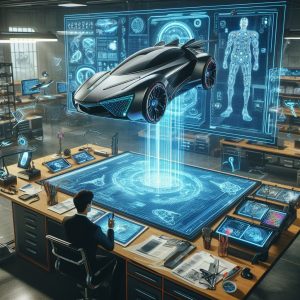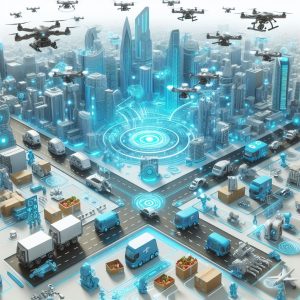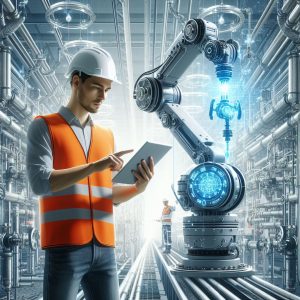Introduction
The automotive industry is undergoing a technological revolution, and artificial intelligence (AI) is at the forefront of this change. From self-driving cars to predictive maintenance, AI is transforming the way vehicles are designed, manufactured, and maintained. In this blog post, we’ll explore the impact of AI on mechanics and the future of maintenance in the automotive industry.
AI-Powered Diagnostics and Predictive Maintenance
One of the most significant ways AI is impacting mechanics is through AI-powered diagnostics and predictive maintenance. AI algorithms can analyze vast amounts of data from sensors in vehicles to identify potential problems before they cause a breakdown. This allows mechanics to proactively schedule maintenance, reducing downtime and increasing the lifespan of vehicles.
For example, AI-powered diagnostics can detect anomalies in engine performance, transmission issues, or brake problems. By identifying these issues early on, mechanics can prevent more severe damage and ensure the safety of drivers.
Predictive maintenance takes AI-powered diagnostics a step further. By analyzing historical data, AI algorithms can predict when certain components are likely to fail. This allows mechanics to schedule maintenance at the optimal time, preventing unexpected breakdowns and minimizing disruption to drivers’ schedules.
AI in the Design and Manufacturing of Vehicles
AI is also playing a vital role in the design and manufacturing of vehicles. AI-powered design tools help engineers create more efficient and aerodynamic vehicles. AI algorithms can analyze wind tunnel data and simulate different design iterations to optimize vehicle performance.
In manufacturing, AI is used to automate tasks, improve quality control, and optimize production processes. AI-powered robots can perform complex assembly tasks with precision and accuracy, while AI algorithms can monitor production lines and identify any potential defects.
These advancements are leading to the development of more reliable, safer, and fuel-efficient vehicles that require less maintenance.
AI-Enabled Self-Driving Cars
The ultimate application of AI in the automotive industry is the development of self-driving cars. These vehicles use a combination of sensors, cameras, and AI algorithms to navigate roads autonomously. Self-driving cars have the potential to revolutionize transportation, reducing accidents, improving traffic flow, and making it easier for people to get around.
While self-driving cars are still in their early stages of development, they are rapidly advancing, and it’s likely that they will have a significant impact on the role of mechanics in the future.
Implications for Mechanics
The rise of AI in the automotive industry has implications for mechanics, both positive and negative. On the positive side, AI can help mechanics to work more efficiently and effectively. AI-powered diagnostics and predictive maintenance tools can reduce the amount of time spent on troubleshooting and repairs, allowing mechanics to focus on more complex tasks. Additionally, AI can help mechanics to learn and improve their skills by providing them with real-time feedback and insights.
On the negative side, the rise of AI may lead to a decrease in demand for traditional mechanics. As vehicles become more automated and require less maintenance, there may be fewer jobs available for mechanics. However, it’s also possible that AI will create new job opportunities in the automotive industry, such as AI technicians and data analysts.
Conclusion
AI is transforming the automotive industry, and this transformation is having a significant impact on mechanics. AI-powered diagnostics, predictive maintenance, and self-driving cars are changing the way vehicles are maintained and repaired. While these changes may pose challenges for traditional mechanics, they also create opportunities for new jobs and skills. By embracing AI and adapting to the changing landscape of the automotive industry, mechanics can ensure their continued relevance and success in the years to come.
The automotive industry is undergoing a profound transformation, driven by rapid technological advancements and the emergence of Artificial Intelligence (AI). While these changes bring promises of increased efficiency, productivity, and safety, they also pose challenges to the traditional roles and responsibilities of mechanics. This blog explores the dangers associated with automotive mechanic jobs, examines the potential for AI to replace certain aspects of the profession, and provides insights on how mechanics can adapt to the changing landscape.
Dangers of Mechanic Jobs:
- Exposure to Hazardous Materials: Mechanics often work with hazardous materials, such as gasoline, oils, solvents, and lead-acid batteries, which can pose potential health risks if not handled properly. Inhalation, skin contact, or ingestion of these substances can lead to various health problems.
- Mechanical Risks: Working on vehicles involves risks associated with heavy machinery, moving parts, and high-voltage electrical systems. Accidents can occur due to improper handling of tools, equipment failures, or lack of safety precautions.
- Physical Strain and Injuries: Mechanics frequently engage in physically demanding tasks, such as lifting heavy components, bending, and crawling under vehicles. Repetitive motions and awkward postures can result in musculoskeletal disorders and injuries.
- Work-Related Accidents: Vehicle repair and maintenance can involve dangerous tasks, such as working under lifted vehicles, handling flammable materials, and operating power tools. Lack of proper training, inadequate safety measures, or human error can lead to accidents and injuries.
Possibilities of AI Replacing Mechanic Jobs:
- Automated Diagnostics: AI-powered diagnostic systems can analyze vehicle data, identify issues, and provide repair recommendations, reducing the need for manual inspections and troubleshooting by mechanics.
- Robotic Repair Tasks: AI-driven robots can perform repetitive and dangerous tasks, such as welding, painting, and parts assembly, with precision and consistency, potentially replacing human workers in these areas.
- Remote Maintenance: AI-enabled remote diagnostics and repair technologies allow mechanics to access vehicle systems and perform maintenance tasks remotely, reducing the need for physical visits to auto repair shops.
- Predictive Maintenance: AI algorithms can analyze vehicle usage data and predict potential problems before they occur, enabling proactive maintenance and reducing the likelihood of unexpected breakdowns.
How AI Will Be Used to Help Mechanics:
- Enhanced Diagnostics: AI can assist mechanics in diagnosing vehicle issues more accurately and efficiently by analyzing data from sensors, cameras, and other monitoring systems. This can lead to faster and more effective repairs.
- Real-Time Assistance: AI-powered systems can provide real-time guidance and support to mechanics during repair tasks, offering step-by-step instructions, troubleshooting tips, and access to relevant technical information.
- Training and Skill Development: AI-powered training tools can help mechanics develop new skills and stay up-to-date with the latest technologies, enabling them to adapt to the changing demands of the industry.
- Improved Safety: AI can enhance safety in automotive repair shops by identifying potential hazards, monitoring work areas for unsafe conditions, and providing real-time alerts to mechanics.
Adapting to the Changing Landscape:
- Embrace Continuous Learning: With AI transforming the industry, mechanics need to embrace continuous learning to stay relevant and adaptable. This includes acquiring skills in AI-related technologies, such as data analysis, programming, and robotics.
- Develop Soft Skills: As AI takes over routine and repetitive tasks, mechanics should focus on developing soft skills, such as critical thinking, problem-solving, communication, and customer service, to remain valuable in the evolving job market.
- Specialize in Complex Repairs: As AI becomes more proficient in handling routine maintenance and diagnostics, mechanics can differentiate themselves by specializing in complex repairs and niche areas, which require higher levels of expertise and human judgment.
- Explore New Opportunities: The automotive industry offers various opportunities beyond traditional mechanic roles. Mechanics can consider positions in research and development, quality control, or technical support, where their knowledge and experience can be applied in different capacities.
Conclusion:
The automotive industry is undergoing a transformation, driven by technological advancements and the rise of AI. While AI presents challenges to traditional mechanic jobs, it also offers opportunities for enhanced efficiency, safety, and upskilling. Mechanics who embrace lifelong learning, develop new skills, and adapt to the changing landscape will be well-positioned to thrive in the evolving job market and contribute to the future of the industry.



